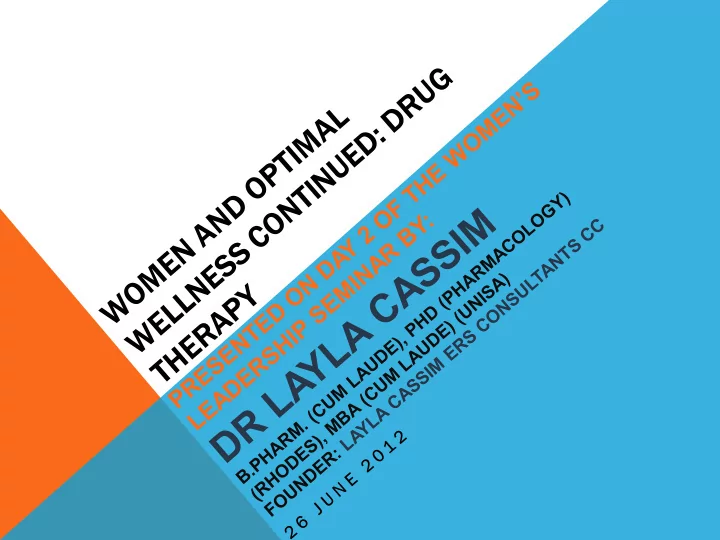

IR IRRATIONAL DRUG USE • Irrational drug use is a major problem. • Can lead to drug-related problems (DRP), which can cause patient morbidity and/ or mortality • Ernst and Grizzle’s (2001) study: the cost of DRP for ambulatory patients in the USA in 2000 was greater than $177.4 billion • Can occur due to errors on the part of prescribers, pharmacists, patients and others who may be involved (e.g. nurses, family members of patients) 2
RATIONAL DRUG USE • Is medication (prescription/ OTC/ complementary) appropriate for a specific patient? • In terms of: • Drug-disease interactions? • Drug-drug interactions (with other medication, including OTC and complementary medicine)? • Drug-food interactions? • Allergies/ hypersensitivity reactions? 3
RATIONAL DRUG USE • Dosage? • Frequency of administration? • Dosage form? • Duration of therapy? • Age? • Weight? • Pregnant or breastfeeding? Or other special-risk population (e.g. elderly, renal failure)? • Possible effects of excipients? 4
PHARMACEUTICAL CARE • Pharmaceutical care is “a practice for which the practitioner takes responsibility for a patient’s drug therapy needs and is held accountable for this commitment” (Cipolle, Strand & Morley, 1997 cited in van Mil, Schulz & Tromp, 2004: 303) • Could decrease the potential for DRP • Involves taking responsibility for a patient’s health outcomes • Not just the domain of pharmacists! Doctors and other health-care professionals can and should play an invaluable role in the provision of pharmaceutical care. 5
PHARMACEUTICAL CARE • The Good Pharmacy Practice (GPP) standards published by the South African Pharmacy Council (SAPC) outline various standards for the provision of pharmaceutical care – pharmaceutical care is not just the technical function of processing a prescription and issuing medication. • These standards include (SAPC, 2010): • Ensuring that pharmacotherapy is appropriate • Detecting drug interactions • Detecting adverse effects of drugs 6
PHARMACEUTICAL CARE • Assessing whether patients are compliant with their pharmacotherapy • Counselling patients (providing information and advice) so that medication is used correctly and safely • Counselling patients about possible dietary modifications • Liaising with other health-care professionals (such as doctors) when necessary 7
PHARMACEUTICAL CARE • Performing a medication review (includes assessment phase, development of a care plan and a follow-up evaluation to assess patient outcomes) • Generic substitution (unless not permitted to do so in terms of the Medicines and Related Substances Act 101 of 1965) • A recent study (Cassim and Dludlu, 2012) found that one retail pharmacy, from the perspective of patients, was always compliant with only 2 out of 10 GPP standards 8
SCHEDULING OF DRUGS • In terms of the Medicines and Related Substances Act 101 of 1965, drugs in South Africa are classified into schedules (S0-S7). • To all intents and purposes, we would only deal with S0- S6. • S0-2: OTC • S3 and above: Need a prescription • Purpose of scheduling is to regulate the access that the public has to different types of drugs: • For patient safety 9
SCHEDULING OF DRUGS • For different schedules, various rules in terms of how they should be stored in pharmacies • Examples: • S2: Decongestant combinations, cough syrups • S3: Antihypertensive medication, oral contraceptives • S4: Antibiotics, antiretrovirals • S5: Sedative-hypnotics, antipsychotic medication, certain pain-killers • S6: Strong opioids (e.g. morphine) 10
SOME GENERAL ADVICE • Always use medication exactly as it has been prescribed • Timing is NB • If you are not sure, ask your doctor or pharmacist • Potential for dependence and abuse with certain drugs (e.g. S2 codeine-containing formulations) • Before taking any new medication (including OTC and complementary/ traditional medicines), always ask your doctor or pharmacist first 11
SOME GENERAL ADVICE • Be compliant with your pharmacotherapy – e.g. antibiotics, chronic medication • Non-pharmacological approaches to treatment are also very NB (e.g. dietary modifications, exercise, physiotherapy) • Useful website: www.gifoundation.com 12
REFERENCES Cassim, L. and Dludlu , D. 2012. ‘Impact of a performance management system in a South African retail pharmacy on the provision of pharmaceutical care to patients’, South African Pharmaceutical Journal , 79(4): 51-58. Ernst , F. R. and Grizzle, A. J. 2001. ‘Drug -related morbidity and mortality: updating the cost-of- illness model’, Journal of the American Pharmacists Association (Washington DC) , 41(2): 156-157. SAPC. 2010. Good pharmacy practice in South Africa . 4 th ed. Arcadia: SAPC. van Mil, J. W. F., Schulz, M. & Tromp, Th. F. J. 2004. ‘Pharmaceutical care, European developments in concepts, implementation, teaching, and research: a review’, Pharmacy World & Science , 26(6): 303-311. 13
THANK YOU VERY MUCH FOR YOUR TIME! Dr Layla Cassim www.laylacassim.co.za lcassimers@gmail.com 0749995847 14
Recommend
More recommend